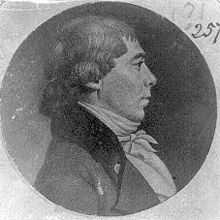David Holmes (politician)
| David Holmes | |
|---|---|
 | |
| United States Senator from Mississippi | |
| In office August 30, 1820 – September 25, 1825 | |
| Preceded by | Walter Leake |
| Succeeded by | Powhatan Ellis |
| 1st & 5th Governor of Mississippi | |
| In office January 7, 1826 – July 25, 1826 | |
| Lieutenant | Gerard Brandon |
| Preceded by | Gerard Brandon |
| Succeeded by | Gerard Brandon |
| In office December 10, 1817 – January 5, 1820 | |
| Lieutenant | Duncan Stewart |
| Preceded by | Himself (as Governor of the Mississippi Territory |
| Succeeded by | George Poindexter |
| 4th Governor of Mississippi Territory | |
| In office March 7, 1809 – December 10, 1817 | |
| Appointed by | Thomas Jefferson |
| Preceded by | Robert Williams |
| Succeeded by | Himself (as Governor of the State of Mississippi) |
| Member of the U.S. House of Representatives from Virginia's 4th district | |
| In office March 4, 1803 – March 3, 1809 | |
| Preceded by | Abram Trigg |
| Succeeded by | Jacob Swoope |
| Member of the U.S. House of Representatives from Virginia's 2nd district | |
| In office March 4, 1797 – March 4, 1803 | |
| Preceded by | Andrew Moore |
| Succeeded by | James Stephenson |
| Personal details | |
| Born | March 10, 1769 Hanover, Pennsylvania |
| Died | August 20, 1832 (aged 63) Winchester, Virginia |
| Political party | Democratic-Republican |
| Other political affiliations |
Democratic |
| Alma mater | College of William and Mary |
David Holmes (March 10, 1769 – August 20, 1832) was the last governor of the Mississippi Territory and the first governor of the State of Mississippi.
Career
Born in York County, Pennsylvania, Holmes and his family moved to Virginia when he was a child. He served as U.S. Representative from Virginia from 1797 until 1808.
Electoral History
1797
Holmes was elected to the U.S. House of Representatives with 60.4% of the vote, defeating Democratic-Republican John Bowyer and Federalist John Steele.
1799
Holmes was re-elected with 83.56% of the vote, defeating Federalist Robert Porterfield.
1801
Holmes was re-elected over Federalist Alexander Sinclair.
1803
Holmes was re-elected with 70.39% of the vote, defeating Federalist Isaac Van Meter.
1805
Holmes was re-elected unopposed.
1807
Holmes was re-elected unopposed.
Mississippi territory
President Thomas Jefferson appointed him fourth governor of Mississippi Territory. Holmes was very popular and his appointment marked the end of a long period of factionalism within the territory. He was the last governor of the Mississippi Territory, serving 1809-17. Holmes was generally successful in dealing with a variety of matters, including expansion, land policy, Indians, the War of 1812, and the constitutional convention of 1817 (of which he was elected president). Often concerned with problems regarding West Florida, he had a major role in 1810 in negotiations which led to the peaceful occupation of part of that territory. McCain (1967) concludes that Holmes' success was not based on brilliance, but upon kindness, unselfishness, persuasiveness, courage, honesty, diplomacy, and intelligence.[1]
Statehood
In 1817, Mississippi joined the Union as the 20th state and Holmes won the election to be the first governor of the State of Mississippi. Holmes took the oath of office in October 1817, though Mississippi did not officially become a state until December of that year. During his term, he established the state judicial system and the state militia and organized the land east of the Pearl River that the Choctaw Indians ceded. He served only six months in office.
In 1820, the state legislature elected Holmes to be one of Mississippi's Senators in the U.S. Congress, and he served from 1821 until late 1825, when his election to another term as governor of Mississippi forced him to resign. Because Holmes's declining health forced him to resign, he served only six months (January 1826 - July 1826) as Mississippi's sixth governor.
Holmes returned to his native Virginia where his health continued to fail before his death in 1832 at Jordan's Sulphur Springs, near Winchester, Virginia, where he still lies in the Mt. Hebron Cemetery.
Legacy
Holmes County, Mississippi is named in honor of him.
References
- ↑ McCain 1967
Bibliography
- Conrad, D.H. (1921), "PMHS", David Holmes: First Governor of Mississippi (Publications of the Mississippi Historical Society), vol.4: 234–257
- Hildreth, Howard P. (Spring 1967), "VC", David Holmes (Virginia Cavalcade), vol.16 (no.4): 38–40
- McCain, William D. (1967), "JMH", The Administrations of David Holmes, Governor of the Mississippi Territory, 1809-1817 (Journal of Mississippi History), vol.29 (no.3): 328–347
- Dictionary of American Biography
- McCormick Quatannens, Jo Anne; Boyle, Diane B., eds. (Spring 1995), Senators of the United States: A Historical Bibliography, Washington D.C.: Government Printing Office, p. 136
External links
| Political offices | ||
|---|---|---|
| Preceded by Robert Williams |
Governor of Mississippi Territory 1809–1817 |
Succeeded by Himself as Governor of Mississippi |
| Preceded by Himself as Governor of Mississippi Territory |
Governor of Mississippi 1817–1820 |
Succeeded by George Poindexter |
| Preceded by Gerard Brandon |
Governor of Mississippi 1826 |
Succeeded by Gerard Brandon |
| United States Senate | ||
| Preceded by Walter Leake |
U.S. Senator (Class 1) from Mississippi 1820–1825 Served alongside: Thomas H. Williams |
Succeeded by Powhatan Ellis |
| United States House of Representatives | ||
| Preceded by Abram Trigg |
Member of the U.S. House of Representatives from Virginia's 4th congressional district 1803 – 1809 |
Succeeded by Jacob Swoope |
| Preceded by Andrew Moore |
Member of the U.S. House of Representatives from Virginia's 2nd congressional district 1797 – 1803 |
Succeeded by James Stephenson |
| ||||||||||
|


